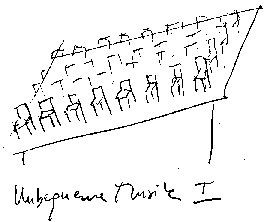PETER ABLINGER - ART AND CULTURE
ART AND CULTURE
a text by Peter Ablinger
german version published in Positionen, 2003, Heft55

So, I see it this way: there's opera and there's music-theater. One is art, the other is culture. And that's all I have to say about it. The rest is explanation.
Under music-theater, put coarsely, I understand everything between Lohengrin and Prometeo. Opera on the other hand, as I'm using the term here, is not a continual component of the culture industry. Rather, it steps out punctually, and always just then, when two things (arts, media) meet each other and yield a third. It began perhaps at the end of the 16th-century in a Florentine villa as the 4 voices of a madrigal were performed, scandalously, not as up until then by 4 singers, but by one female voice accompanied by instruments. Opera - thus understood - is not a category, but breaks through categories.
Music theater has also to do with what is already here. Here as an institution, a performance location,
an object of education, a cultural budget, a term in heads. It is like an instrument to be played. Whereas
opera is like an instrument is discovered, rediscovered, and created anew.
Music-theater of the last 25 years, insofar as it appears to me discussion-worthy, was only possible at the price of the theater. Hence: Nono/Lachenmann/Furrer, they have all made the share of the "music" absolute in order to save the "theater" - but actually, the move was unnecessary and concertante performances lost nothing more, for the music itself had taken over direction and action, and librettos and directors themselves were often present only as sources of irritation. Only Nono, he who saw clearly, immediately understood the concertante performance as theater, and in the consequent renunciation of the medium of visual performance, Prometeo is perhaps the necessary last step that music-theater can take - with which it is already again opera.
That here the term "opera" will not be used as a historical one is something others have done before (Bertold Brecht's "Three Penny Opera", Robert Ashley's "video operas", ...); and yet historically opera once was the meeting-place of genres, arts, and media - and from this perspective a wide field opens up: a horizon of possibilities, of modes perception and action, in which the variety and inconclusiveness alone of terms such as sound-installation, sound-art, concert-installation, instrumental-theater, visual-music, text-music, music actions in public space, interactive music forms, net-music, ... proves just how far underway developments on this terrain were and NOW are.
As various as the individual statements of this current development also are, they appear (beside their rage against dusty institutions and self-propelling cultural forms) to still have something in common: the hero/ines of these operas. As scandalous as the individual's move to center was once felt to be, the stepping forward of the person from the music in said Florentine villa, it is today as equally uncommented on - I almost want to say, 'as equally taken for granted' - that the majority of the time the hearer him/herself is at the center of the action; when s/he, for example, wanders between the sparsely placed objects of an extremely reduced installation in a background of at once real and imaginary stage-space, and is prompted by these finely-dosed incentives to perceive him/herself perceiving. Of course "operare" has always already meant "to act", but it is only in our time that the listener/observer is itself integrated into the Opus as a part of the action. S/he acts in the form of active perception.
In my differentiation of opera and music-theater there is doubtless the element of a plea. But this is directed not against music-theater; I've valued many a piece from this genre. The plea is also in no way meant as for the new. That's only an article of fashion. It is rather for a wakened spirit. And for the intelligent combination of given resources. My attention in this regard applies to that which I have described as opera, to a still-not-redeemed, a possibility, a transient, fleeting site - scarcely reality, precisely: art.
P.S.
The ideology of growth, growth as value and goal in itself, is the direct consequence of colonialism and imperialism. Growth means using-up resources that are then not available to the other half of the world. And that will also not be for following generations. An openly brought to light and standing crime. Or at least it remains urgent to hope that the ideology of growth will be at some point seen in a row with colonialism and imperialism, and recognized as criminal.
What this has to do with opera and music-theater is irrelevant. Today the U.S. has begun its war in Iraq.
(translated by Bill Dietz)
back to: OPERA/WORKS
 Aljoscha Hofmann \ last edited 25.08.2006 CET
Aljoscha Hofmann \ last edited 25.08.2006 CET